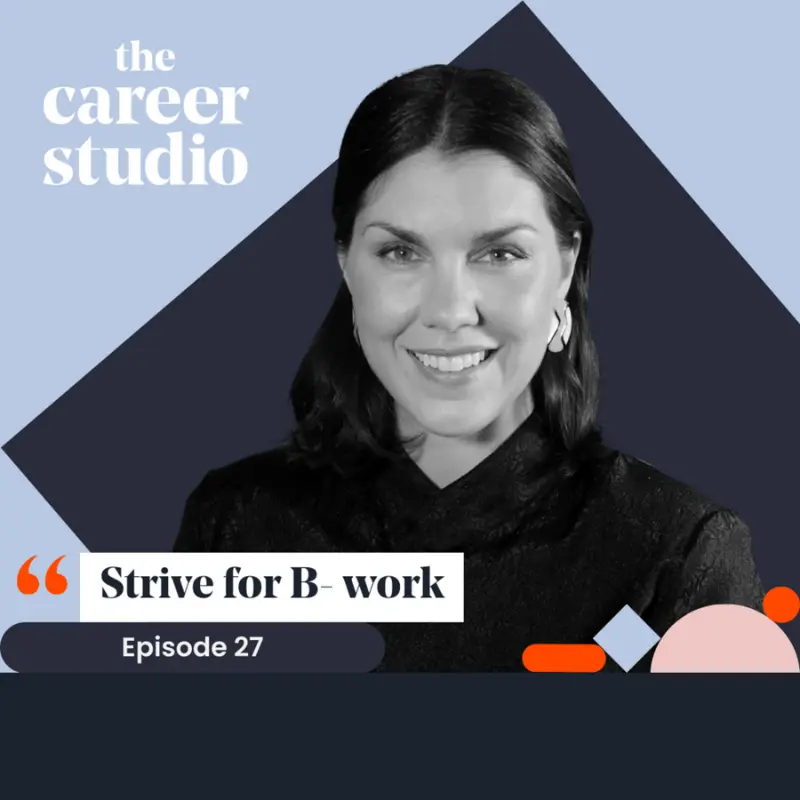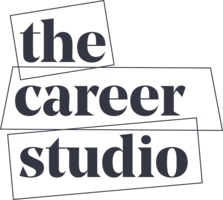Strive for B- work

When we strive for an A in everything, when we want everything to be perfect, we are either unable to keep up with life’s competing demands or we burn out. So what if I told you the secret is striving for B- work? If you’re a chronic over-achiever that is going to feel deeply uncomfortable. And that’s exactly why you’ll want to listen to this episode.
I discuss:
- The economic principle behind my recommendation to focus on B- output
- Why an A works in school but not in real life
- The negative results created from constantly striving for As in everything
- Personal lessons from my own experience unwinding from over-achieving
Are you ready to create an energizing career you love?
You can create a career that is simply an extension of who you are and how you want to live your life. If this sounds like what you’re after then schedule a consultation. We'll get to the bottom of what's going on for you. And exactly where you need to focus to bring your career and life into alignment. It's free!
For more from The Career Studio
Transcript
Welcome to the career studio podcast, where we boil down the noise and focus on the core concepts, essential for building an energizing career you love. One that is simply an extension of who you are and how you wanna live your life. Anyone can do it. It's just a matter of knowing what to focus on.
All right, hello. You may have noticed that there's been a month between this episode and last episode or you may not have noticed at all. Kind of one of those things that you pay attention to if you're making them, but not so much if you're consuming them.
Either way, I wanted to address that because I am in the process of restructuring my business to support my growth. I'm working on developing a group program, which I am really excited about. I think the possibilities or what is possible when I teach my program to a group and to have the group feed off each other and support each other is going to be a really exciting way of creating these results.
So I am in the process of doing that. And what that means is I have to do less somewhere else in order to create space to do that. And so one of the ways I'm going to create more space is by only releasing one podcast episode a month. That's at least the plan. Maybe you'll get two, if I'm feeling inspired and something just, I really want to capture and share something or you know, I'm not committing to that, but you should expect that over the next three to six months or so, I'll only be releasing one episode a month and with the aim of always the first Tuesday of the month or the first week of the month.
So if you are on my email list, you will get a notification of when that comes out or obviously if you're subscribed on whatever apps you use or Spotify, you'll get a notification of that, but that won't be the long term solution, but it'll be the temporary solution while I am making some big changes.
I'm also working on some other projects around redoing my content strategy and hiring some people to support me. So I'm really excited about this next phase of growth for my business. It feels time and yeah, you know, you have to sometimes slow down to speed up. And so that's what I'm going to be doing.
So I wanted to talk today about something, a topic that performs really well on my LinkedIn and email recently. And if you're an avid follower of me on those platforms, you will know about this concept. And if not, welcome. I'm going to talk about the idea of B minus work, that once you graduate from university or college, B minus work is really the secret to success. And before I dive into this, I'll just say that the term B minus work is actually coined by the coach that I got certified through Brooke Castillo.
So I want to give her credit though the way that I explain it and contextualize it and use it is slightly different than than how she does it, but she, she's where I got this idea of using the term B minus work. So me telling you B minus work is a secret to success is going to feel super uncomfortable for all of you chronic high achievers and self identifying perfectionists of which I think much of my audience falls into this category.
And I really get it because I'm a reformed both of these things, high achiever and perfectionist. I think you know, the, the belief that getting everything perfect, that's just how you operate, right? Because surely getting A's in everything is what got you into university and then what helped you get on the career path you're on and helped you get all the accolades or any accolades you've been awarded along the way, promotions, special mentions, interesting opportunities.
Surely all of this is because you focus on getting an A. In whatever you do, getting everything right is also how you ensure that the people in your life like you and want to stay in your life, right? If I show up and I'm always performing at an A, then all of that will be taken care of. Getting an A is how you measure if you're doing a good job or not in life.
If I feel like I'm getting an A, if I feel like I'm doing my best, then I'm doing a good job. All right. And if I'm not getting an A, it means I need to work harder and I need to be better. Right. So basically what made me successful in school, getting A's should make me successful in life, right? No, wrong.
Obviously that's why I'm going to talk about B minus work. Okay. So striving for an A in everything, striving to achieve, achieve, achieve perfect, perfect, perfect. It's a coping mechanism. Okay. Perfectionism or an unending quest for achievement is a coping mechanism to when we experience feelings of self doubt or low self esteem or uncertainty, right?
Because if we make sure everything is perfect, then no one can fault us, right? I'm less likely to experience disappointment if I make sure everything is perfect. I'm more likely to get what I want. If I achieve, this is how I make sure my life is a success. If we are always focused on perfectionism, going for the A, this ensures there's as little opportunity for failure as possible.
That's a way of navigating life that a lot of high achievers adopt. Okay. And this works well for a long time. It really works well for a long time. Obviously in school, this works and you know, for much of our life up until the point where you feel like, Oh wait, maybe there is a cost to this because there are costs.
There are significant costs to this approach. So time wasted, I think about the amount of time you spend rereading an email or a piece of copy, going over a piece of work to make sure it's perfect. Right. A lot of my clients who struggle with this way of being really recognize this. They know that they spend tons and tons of time reviewing things that they probably don't need to do. So think about all that extra time that you're using on that. Okay. So that's time you could spend on other things. And we're going to get into that. Another cost is making decisions that aren't in alignment, right? So if we are focused on always achieving, always trying to get everything perfect, we're not actually paying attention to what do I enjoy?
Do I like doing this? Is this what gives me energy? Because we're just focused on getting it right. Or getting the star or ticking the box of what we think we should do or focused on a lot of shoulds or focused externally on what other people will think. And we're not focused on what do I actually want?
What makes me feel good? Okay. Obviously there's a, there's a nuance here between, you know, creating something and wanting to present it in the best light possible, but doing this all the time on everything. Or as your kind of default to navigating life, that's where it starts to get toxic and unproductive.
Another cost is going for perfectionism, striving for the A. This can lead us to live in contraction. What I mean by contraction is emotional contraction. So beating ourselves up because it's not as good as it should be, right? When we're constantly striving for it to be perfect, we're also constantly criticizing ourselves or looking for what isn't.
Right. It's not good enough yet. I'm not good enough yet. I need it to be perfect in order to be good enough. And that's a lot of negative self talk that makes us feel small. Okay. And then what happens is things don't become as enjoyable as they could be because we're so focused on having them be perfect, right?
We suck the enjoyment out of it because it's about perfection, not about creation. Or we procrastinate on things because everything we do has to be perfect, right? So if everything has to be perfect, that's a lot of effort, right? And so then you're like, Oh my gosh, that whatever it is on your to do list, it's going to take so much time.
So I procrastinate on it because I like, I know that what I'm going to put myself through. To create it is going to be heavy. And so I don't want to do it. And so those are a bunch of costs, but really the, the macro cost that I want to communicate and what this podcast is really about is when we strive for an A in everything, when we're obsessed with perfection in everything we do.
We are unable to juggle life's competing demands, okay? So you may have heard of the economic principle that 20% of the work delivers 80% of the impact. It's called the Pareto principle if you did an MBA or economics, you've heard of it. Okay, so 20% of the work delivers 80% of the impact.
Okay, what's an 80% guys? It's a B. So 20% of the work gets you to a B minus. Okay. So that means there is an 80% of work that is required additionally to get an A. It's a 20% of work gets you a B minus. You have to put in an extra 80% to get an A. Right? And that's a lot of work, right? So that means if you're looking at your time, you can get an A in one thing, or you can get a B minus in five things.
So let's look at this a little bit more historically, like let's look back at school and remember how few responsibilities we really had when we were in school, which meant we had a lot of extra time to put in that 80% of work required to get an A. You know, we are set up in many ways to be able to focus all our time and energy into performing and achieving as well as we could within the education system, right?
So if you're studying for the SATs or your A levels, it's pretty much all you're doing, okay? Your parents are looking after the bills. They're keeping the house running. They're cooking you dinner. And then you go get to visit your friends or your girlfriend or your boyfriend when you're done studying, right?
You're basically just set up to focus all your energy on getting as good scores as possible. Obviously not everyone is lucky enough to have their home set up this way, but for the majority of my listeners, I believe this is the case. Okay. So in school we can get the A because that's what we are literally set up to do.
Okay. But as soon as we get out of school, striving for A's and everything is completely unsustainable. So let me give a personal example on a micro level. If I strive for an A on every one of these podcasts, I would not have time to do all of the other things that's required for me to run my business, right?
I have to write my social posts. I have to write my emails. I have to prepare for my clients. Respond to their emails. I have to improve my tools and make sure that what I'm teaching is as strong as possible. I have to create space to build and launch a new group program. I have to do my accounting. I have to network, right?
All of the activities that are required to run my business. If I am striving for an A on every one of these podcasts, I'm going to eat into the amount of time I have to do all those other things. And actually I've talked about this before because in the first few episodes I created for this podcast, I reverted back into my overachieving perfectionist tendencies and wow, these episodes took me eight hours to write.
And then I would practice them before I delivered them and right. So it's like days and days of work to create one 30 minute episode. Right. And so that cost me time and energy. It cost me also authenticity. I had a friend say that it didn't sound like me as much because I was mostly reading a script, right?
I basically scripted out a 30 minute episode versus now I kind of write bullet points or general phrases that I want to mention. And I riff off of that to have more of an outline versus a script, right? And so that's really draining. It takes up a lot of time. And then I lost the enjoyment in doing it because of my God, imagine every episode, two episodes a month, taking me a couple of days, right?
So that's, that's a, on a micro level of my business, an example of the cost of striving for an a, right? And on a macro level, where you look at my life holistically. If I strived for an A in my career, everything in my business had to be going at 95, 100 percent, then I wouldn't have time to also do all the other things in my life that are important to me.
Okay, so cultivate friendships and an active social life. I'm currently redoing my basement and my garden. That's a big project. I, you know, manage and maintain my finances, explore my interest in music, keep physically fit, read, surf, see my family. You know, I like to go up and see my sister and my parents as often as I can. So all of this takes time. And if I was always giving my free time to work, I wouldn't have time to pursue all these other things that give me energy and bring me joy.
When I start with my clients, there's an intake form. And part of what's on that intake form is for them to look at all the areas of their life and rate them on a scale of one to 10, how they feel they're doing. Right. So career, family, romance, wellness, recreation, friends, spirituality, right? Rate that. How do you feel about this area of life? And let me tell you that people feel really good about an area if they're getting an eight, an eight is a good score, right? If you had an eight out of 10 on all those areas I just listed, you'd feel pretty damn good about your life, right?
And okay. What's an eight out of 10 people. It's an 80%. It's a B minus, right? Look at that. Turns out a B minus in life is pretty fucking good. So given that 20% of the work delivers 80% of the impact, I'm always looking at my to do's and asking myself what is absolutely essential, right? What's that 20% that's going to get me 80% towards what I want on all the fronts.
So when I look at my to do list, I'm scanning for what absolutely has to get done this week. And that's what I schedule first. Right? And, and let me tell you, there's a lot of disappointment every week when I look at actually the amount of time I have that I can't fit in more. There is more I want to do.
I would always like to be moving faster. I'd always like to be doing more things. For example, there's this course on trauma. That I've been taking it. It's like a self paced course, and I'm always wanting to sit down, watch the modules, take notes. Right. But it's, it's not a priority. There's other things that I'm doing and I'm constantly pushing it because I have more important projects.
And so, you know, I probably bought that course six months ago and I've watched, I don't know, one and a half out of 12 chapters or modules. So I'm making, I'm making progress, but it's very slow. It's incremental.
You know, I had a bunch of financial management and planning I needed to do. I needed to go through the last few months, look at my spending, make some decisions about what I wanted to do because I'm trying to invest some stuff in my business, et cetera. And each one of those financial planning sessions, when I look at my spending for the month, right, that takes a couple hours for me to do and I wanted to get to the answer quicker and I wanted to be done with it, but I realized given the amount of time and energy it took, like I, I had to spread it out over multiple weeks, right?
Because I also had other stuff I wanted to do during that week. It wasn't just about the finances. It's not just about the course on trauma. I'm balancing it with everything else. Right? So I'm always looking for what absolutely must get done. And that's what I scheduled first. Then I give myself limits on how long I spend on things.
Right. A limit is a great forcing function, right? So on these podcasts, I now give myself two hours max to write an outline. When I was writing this outline, I actually wrote it last night, a little bit late for me. And by the time I got to this part in the outline, it was basically 9:30 at night. And that was it.
And it was actually 90 minutes from when I started writing it. But I have a very hard stop in terms of my sleep schedule. I really need to sleep, go to bed around 10:30 and I know that I need at least an hour away from screens in order to wind down and be able to fall asleep relatively quickly when I turn off the lights around 10:30.
So I basically had to stop writing the outline for this podcast around 9:30 last night. Because I was like, okay, I'm nearing the end. This is what it's going to be. You know, certainly I could have gone back and maybe added some different examples, explained how I do it a little bit differently.
For sure this podcast could be better, but where I've gotten, I know is good enough, right? I know I've generally gotten across the point I want to make. I know this is based on the content, like a much shorter piece of content that I put on my website, It's good enough. It's definitely a B minus, right? I did the 20% of work that I know is going to get me to be minus and because I stopped then I was able to get a good night's sleep.
I was able to wake up and have a good morning routine before I started my day. I have now time today to do a lot of other stuff that I need to do. So that's the call I made, right? And what I have to deal with is the fact that I know it could be better. Yeah. Right. But I ground in, it's good enough because it allows me to do all these other things that are important to me, both in my business and in my life.
Okay. So striving for a B minus at first, right? If you're always going for the A, the A, the A, it feels uncomfortable because it always feels like things are half done. But once you start to operate, right? Once you just allow yourself to feel that discomfort, don't try and resist the discomfort. Just allow it.
You're going to feel uncomfortable and you have to embrace that. That's part of the growth that you need to go through. If you're going to become someone who's comfortable submitting B minus work, you have to allow yourself to feel the discomfort of like, Oh my God, this is half done, or I could be doing more.
I want to spend more time on this et cetera. But ultimately it'll become this very freeing approach, almost self fulfilling approach because you will feel more energized, you'll have more time for what's important to you. You're going to feel more balanced. You're going to spend less time beating yourself up, which means more self compassion, which means more feelings of expansion, which helps you create new things.
So basically guys, the more you care less, the more you can do what's important to you and create a career and a life you love. So get out there and go do some B minus work and create a B minus life. Have a great week.
Hey, if you're ready to create an energizing career you love, one that is simply an extension of who you are and how you want to live your life. Then I wanna invite you to schedule a consultation. We'll get to the bottom of what's going on for you. And exactly where you need to focus to bring your career and life into alignment. It's free. Just head on over to thecareer.studio/schedule to find a time that works for you, or if you're enjoying and getting value from these episodes, I'd love you to leave a short review on whatever podcast app you use.
This helps other people like you find and get value from the podcast too.



